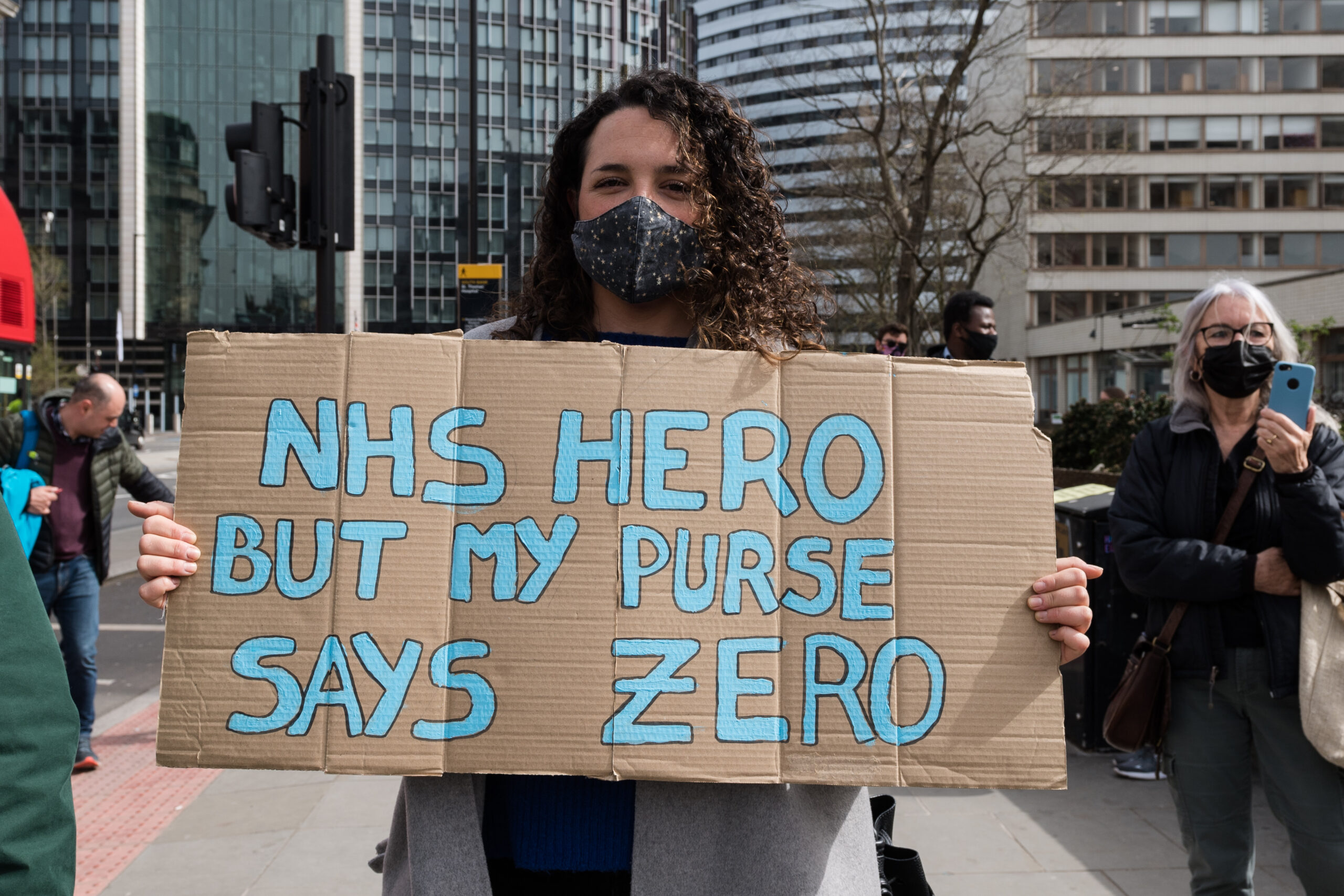No, Higher Wages Won’t Fix the Cost of Living Crisis
But we should demand them anyway.
by Matteo Tiratelli
1 August 2022

The Institute for Fiscal Studies (IFS) is an unusual institution. Founded in 1969 by four financial professionals in response to then Labour chancellor Jim Callaghan’s plans to reform the tax system, it has since evolved into Britain’s most prestigious and studiously non-partisan economic think tank. This year, its annual report on living standards, poverty and inequality emerged just as Boris Johnson announced his time as prime minister would soon be coming to an end, and it paints a complicated and contradictory picture of his last year in office: everything changed so that everything could remain the same.
The report focuses on the first year of the Covid-19 pandemic and its authors find themselves in a surprisingly positive mood: furlough basically worked. While GDP collapsed at an unprecedented rate, the average household in Britain lost less than 2% of its income, while the poorest households’ income actually grew by about 3%.
Despite its many gaps and limitations, the unprecedented furlough policy meant that millions lost jobs but not income. And while reduced wages hurt everyone, it mattered less to those already earning poverty pay and whose incomes were bolstered by the (since scrapped) £20-a-week uplift to universal credit (UC).
Few people would have expected inequality to go down during a pandemic under a Tory government. It wasn’t supposed to. This was not a deliberate strategy, nor should we expect those small changes in inequality to become permanent. But the haphazard and reactive way that Johnson and Sunak made economic policy has had some unexpected benefits.
Take national insurance, for example. In December, Johnson announced a new health and social care levy via a national insurance increase to pay for rebuilding the NHS after the pandemic. But fewer than five months later, under pressure from Labour and Tory MPs, that increase in NI was coupled with an increase in the threshold at which we start paying it. This means that poorer households are likely to see their NI payments go down, while richer households will have to pay more.
Confusingly, the IFS points out that Johnson has done the opposite when it comes to income tax. Here thresholds have been frozen and the rates cut, imposing a “stealth tax” on most people and making income tax less progressive than it was before.
Changes to benefits have gone through a similar see-saw motion. Despite a wave of criticism, Sunak brought the UC uplift to an end in October, threatening millions with poverty. But in the last few months, he introduced a whole raft of new income support policies that will more than offset that £20 a week. Where do we go from here?
In its focus on the first year of the pandemic, the IFS report feels strangely out of date. This is no shade on the researchers, who can only work with the data available. But it means the report is light on stories of skyrocketing inflation and possible global recession. Nevertheless, the longer history that it describes is just as bleak.
If wages in the UK had risen at the same rate as house prices, the average person would be earning around £34.85 an hour.
But sure, a minimum wage of £15 an hour is unreasonable… 🙄 pic.twitter.com/NgeatyIhVk
— Novara Media (@novaramedia) October 5, 2021
It’s well known that the UK has suffered 15 years of lost growth: since 2007, typical incomes have fallen by 2% in Britain, while rising by 34% in France and 27% in Germany. But, in many ways, our troubles began long before the so-called Great Recession. Although there was a rapid fall in poverty rates during the 1990s, this had started to slow by the early 2000s as incomes stagnated. GDP growth has also been falling since the 1960s. Despite the invention of the iPhone, we haven’t seen sustained productivity gains for decades.
The right has a clear answer to this problem, trumpeted by both candidates for Tory party Leader: tax cuts, deregulation and privatisation. But while these might resonate with the Tory base, even the Financial Times doesn’t believe they will work.
Unfortunately, the left doesn’t have an answer of its own.
As shadow chancellor under Corbyn, John McDonnell argued that higher wages would stimulate the economy, increase investment and boost productivity. But while higher wages might be valuable on their own terms, it’s far from clear that these demand-side approaches will work in the long run.
Others on the left are turning away from productivity altogether, calling for degrowth and an end to our obsession with squeezing every last drop out of the world around us. Others want to renew the anarchic spirit of the late 1960s and are reluctant to embrace anything that smells like the grim, grey productivism of postwar social democracy.
In part because of these disagreements, the question of how to grow the economy has taken a backseat to demands for redistribution. While it’s true that, in an age of rampant inequality (which has been high and stable since the end of the 1980s), redistribution could go a long way, we also need to recognise that over the last 50 years, productivity gains have driven rising living standards, not redistribution.
If the left wants to win people over with the promise that our lives can be made materially better – that we can guarantee “the right of the poor to an abundance of everything”, as the Irish Chartist Fergus O’Connor put it – then we need a strategy to deliver it. Older generations of socialists had central planning and then Keynesianism. Today, we have the Green New Deal, the Preston model and Mondragon. And I don’t know if that will be enough.
Matteo Tiratelli teaches sociology at University College London.

